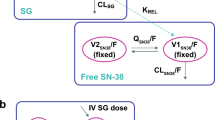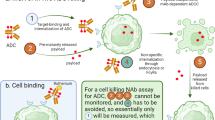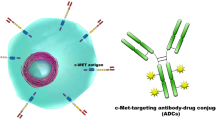Abstract.
Elevated renal uptake and prolonged retention of radiolabeled antibody fragments and peptides is a problem in the therapeutic application of such agents. Over recent years, one of the focuses of research has therefore been to develop suitable methods to reduce this renal uptake, and to evaluate whether the resulting methodology will benefit therapy with antibody fragments and peptides. In these studies it has been shown that the kidney uptake of antibody fragments in animals can be reduced in a dose-dependent manner by almost one order of magnitude by the systemic administration of cationic amino acids and their derivatives, whereas the uptake in all other organs, as well as the tumor, remains unaffected. A similar reduction in renal retention is achieved for all intracellularly retained radionuclides (e.g., radiometals) or radioiodinated immunoconjugates, as well as for smaller peptides. Lysine is usually the preferred agent, and its d- and l-isomers are equally effective whether given intraperitoneally or orally. Amino sugars are effective, but their N-acetyl derivatives, lacking the positive charge, are not. Basic polypeptides are also effective, and their potency increases with increasing molecular weight (i.e., the amount of positive charges per molecule). Urine analysis of treated individuals shows the excretion of unmetabolized, intact fragments or peptides, in contrast to mostly low-molecular-weight metabolites in untreated controls. In therapy studies using radiometal-conjugated Fab fragments, the kidney is the first dose-limiting organ. Administration of cationic amino acids results in a substantial increase in the maximum tolerated dose of such Fab fragments. No biochemical or histological evidence of renal damage has been observed under these conditions. As was the case in animal studies, in pilot clinical trials the renal uptake in patients injected with Fab′ fragments and given amino acids could be decreased significantly, whereas the uptake by all other organs remained unaffected. These recent studies indicate that a variety of basic compounds are capable of inhibiting the tubular reabsorption of peptides and proteins, thus significantly lowering the renal uptake of antibody fragments or peptides in both animals and patients. On a molecular basis, the effect seems to rely essentially on the presence of a positively charged amino group. Thus, radiation nephrotoxicity of antibody fragments and peptides can be overcome successfully; this may provide new prospects for cancer therapy with radiolabeled antibody fragments and peptides.
Similar content being viewed by others
Author information
Authors and Affiliations
Rights and permissions
About this article
Cite this article
Behr, T., Goldenberg, D. & Becker, W. Reducing the renal uptake of radiolabeled antibody fragments and peptides for diagnosis and therapy: present status, future prospects and limitations. Eur J Nucl Med 25, 201–212 (1998). https://doi.org/10.1007/s002590050216
Issue Date:
DOI: https://doi.org/10.1007/s002590050216




